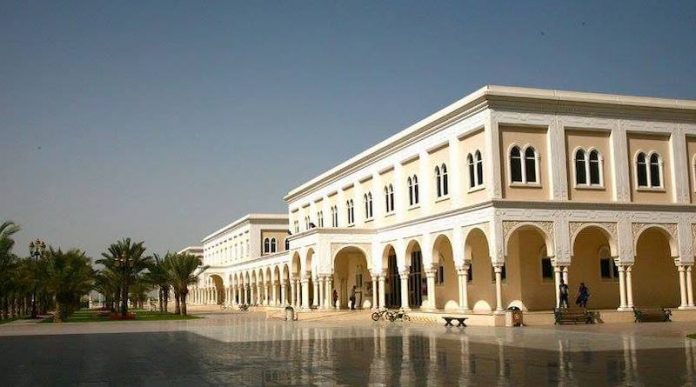By Fatimah AlMustafa
UNIVERSITY CITY— The American University of Sharjah’s Security Office’s mission is to ensure the campus is safe, and it does this largely by encouraging a sense of responsibility among students, according to AUS administrators.
In a series of interviews, representatives of the main building outlined the university’s efforts to protect and serve its community, while at the same time trying to help create more disciplined young people entering the workforce.
Incentives, not punishment
AUS’s security policies encourage good behavior rather than simply punish infringements, according to the campus’s chief of protocol.
Speaking in both Arabic and English, Saeed Al Shamsi, whose office oversees the security department, noted that the parking fine system, for example, is meant to help “rehabilitate” student drivers, rather than simply be punitive.
Parking fines “start from Dh50, which is the least in the UAE,” he noted. “If our aim was to punish students, we would charge them at least Dh300.”
The point of this relatively lenient fine system is to guide students toward taking a more responsible and courteous approach regarding the rights and needs of others, he said.
He acknowledged, however, that some infringements carry stiff penalties. For example, according to Al Shamsi, the fine for parking in disabled spots is Dh300.
“By raising the fine for parking in handicap spots, we are teaching the student how to be disciplined, and at the same time, how to respect other people’s rights,” Al Shamsi said.
Courtesy and comfort
Where students may encounter the security office on a daily basis is at the visitors’ gates – where vehicle access stickers are scrutinized – and sometimes in the parking lots. Finding a space for their car is often an ongoing battle for AUS students. With over 3200 parking spaces, but about 4800 students, many commuters still complain about the lack of parking spots near the academic area. This includes students who have paid for parking stickers, but struggle to find available spaces and end up parking in a free lot, far away from their college.
Toward fixing this, Al Shamsi noted that the security office has announced plans to build a covered walkway connecting the free parking to the academic area. The goal, he said, is to make it more convenient for the students to walk in a shaded area.
“The two problems students are suffering from in the free parking area are the weather and distance,” Al Shamsi said.
He added that providing a covered walkway will solve the problem.
“The committee has submitted its final proposal to the higher management to be approved and have a budget assigned,” Al Shamsi concluded.
Parking priorities
He stressed, however, that the security office continues to monitor the paid-parking areas for residence hall students who leave their cars there. According to Al-Shamsi, the number of paid-parking spaces is limited to 1529, and only students who live off-campus can park their cars in that area. Those parking without authorization risk the aforementioned Dh50 fine.
“Priority for paid-parking spaces is given to students living outside of the university residence halls. Students living on-campus can either park at the dorms parking or free parking area,” Al-Shamsi said.
Even though paid-parking spaces are available to a limited number of students, some students still complain about the lack of spots near the academic area.
“The paid-parking zone is not a reserved one,” Al Shamsi noted. He added that if there is a lack of paid spaces available, students will have to park in the free area.
Respectful environment
AUS officials also stress that students should dress properly while on campus. In part this reflects the laws of Sharjah. But as Security Officer Ishaq Almazam observed, it also helps to maintain the good image of the university
To that end, the university has banned tight-fitting clothes, revealing clothes, short skirts and other inappropriate outfits such as party wear from being worn by students. Almazam said that dress code policy is not only applied to women, but also to men, who are not allowed to wear gym shorts or tank tops while on campus.
“Student dress is not just a matter of taste, comfort, or convenience, but it must be socially acceptable and not distracting,” Almazam said speaking in Arabic.
Almazam added that violators will be sent to the Office of Judicial Affairs for disciplinary actions.
“UAE values are built on moral heritage and so students should respect dress codes, which is very important as it affects students’ behavior and academic performance,” Almazam said.
Security cameras
Technology also plays a role in safety on campus. In recent years, AUS has employed high-tech devices to monitor traffic and parking patterns in an effort to improve the flow of cars on campus. Al Shamsi also noted AUS uses a network of CCTV cameras to provide a secure environment for students, staff and visitors. According to Al-Shamsi, the monitoring system is a security tool designed to deter, document and reduce crime.
“There are 399 cameras placed in public areas, inside and outside AUS buildings,” Al-Shamsi said.
“We faced numerous cases of theft incidents. In some cases, the thieves were identified using the footage of the surveillance camera,” Al-Shamsi said.
He added, “If the thief was an AUS student, we normally report the case to the Office of Judicial Affairs. However, if he was an outsider, we report the case directly to the University City police.”
Despite the high number of cameras on campus, they don’t necessarily cover every angle of every building, as some students have learned after reporting thefts. Security Officer Syed Waqar Ahmed said the Security Department is planning to add more surveillance cameras across the campus in the near future.
Students fighting
Although it happens very rarely, occasionally students do get into fights on campus, Almazam said. AUS takes such incidents very seriously, he said, noting that participants will be sent to the Office of Judicial Affairs or, if injuries are involved, Sharjah Police.
For those sent to the judicial affairs office, “The offender will face a fine starting from Dhs50,” according to Almazam. “The fine will be doubled each time the student gets involved in a fight.”
However, in some cases the university may opt to give counsel and advice instead of punishment, according to Al-Shamsi.
“If it’s the student’s first time making the mistake, and he apologized and showed remorse, in this case we give him advice and guidance instead of penalizing him,” Al-Shamsi said.
Responsible generation
According to Al Shamshi, one of his department’s goals is to help create a more responsible generation that can discipline itself. This is part of an effort, he said, to help continue building a good image of the university.
He said the security department spreads awareness through workshops, campaigns, emails, posters, and hand pamphlets. “Before we launch a campaign we normally coordinate with other departments, such as the Office of Student Affairs,” Al Shamsi said. One example he cited is the ongoing anti-smoking effort.
Aside from such projects, Al Shamsi stressed that the university’s priority is to provide 24-hour-a-day protection to its students and all members of the campus community. This in turn, he noted, is a key element in the university’s image. “What attracts parents to AUS is not only that it’s academically strong, but it’s also safe,” Al Shamsi said.


















